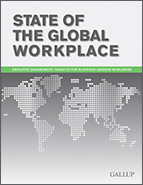Employees aren't forgiving of leaders who don't do everything within their power to take care of their employees and their company.
There is a great deal of talk in the United Kingdom about the things companies are doing to improve morale at work, but these initiatives don't appear to be making much difference to how most people feel about their jobs. In 2012, the proportion of employees in the U.K. who felt involved and enthused at work remained flat -- a percentage that hasn't changed since Gallup's last global workplace study conducted in 2009-2010. Slightly fewer than one in five British employees are engaged at work.
Since the start of the Great Recession, the U.K.'s productivity gap versus other G7 nations has widened. According to the Financial Times, only Italy's productivity is worse. Raising the level of employee engagement among the country's workers is probably the fastest and least expensive option for U.K. firms to start to bridge the productivity gap, and in turn, sustain the budding economic recovery.
What creates engagement at work?
In the U.K., 17% of employees are engaged, or emotionally invested in and focused on creating value for their organizations every day. By contrast, 57% are not engaged, and 26% are actively disengaged, or emotionally disconnected from their workplaces and less likely to be productive. At least employee engagement hasn't decreased in the U.K. over the past four years, despite an uninspiring economic backdrop and the uncertainty it creates. It could be that employees have lowered their expectations at work amid the crisis and their own fear of losing their jobs -- but this is unlikely because people experience engagement in the moment, and it is primarily an emotional rather than a rational state.
The more likely reason is that employees' engagement levels have less to do with circumstances external to the company and more to do with workplace conditions over which leaders and managers have a great deal of influence. Poor economic conditions need not destroy what is fundamental to people at work: clear expectations, feeling cared for, knowing your opinion counts, doing work that matters with colleagues you can trust, and having opportunities to improve and advance professionally.
Indeed, a Gallup multiyear study of 30 exemplary organizations responsible for more than 600,000 employees, which examined why some companies are able to buck the global trend of miserable workplaces, revealed that engaged companies never use macroeconomic conditions as an excuse for failing to create an engaged workforce. Quite the opposite -- difficult times spur them on to try harder to keep their employees loyal and hopeful about the organization's future. Conversely, employees aren't forgiving of leaders who don't do everything within their power to take care of their employees and their company when times are hard.
In the U.K., a handful of companies that we partner with have managed to keep their workers' spirits high despite lackluster growth, restructures, and pay and benefits freezes. As Nassim Nicholas Taleb notes in Antifragile: Things That Gain from Disorder, "Antifragility is beyond resilience or robustness. The resilient resists shocks and stays the same; the antifragile gets better." Higher engagement has made these companies antifragile -- and better.
Raising engagement levels will spur productivity growth
In my experience, few executives facing economic headwinds know how to keep workers motivated to help see their companies through. Yet leaders who do are likely to realize dramatic productivity returns, given that:
- Engaged employees are outnumbered. For every enthusiastic employee in the U.K.'s labor force, about 1.5 are actively disengaged. This compares with ratios of 2-to-1 (engaged employees to actively disengaged employees) in Denmark and Norway. The most engaged workplaces Gallup has studied -- a handful of which are in the U.K. -- have, on average, nine engaged employees for every actively disengaged one.
- Eliminating active disengagement can spur productivity growth. Gallup research reveals that eliminating active disengagement from the workforce would result in a significant increase in output per worker. This increase, applied against the current average output per U.K. worker, would amount to between £52 billion and £70 billion (approximately US$83 billion to $112 billion) in productivity gains nationwide per year.
- Most employees are frustrated at work and feel they could contribute more. Fifty-seven percent of employees in the U.K. are not engaged at work. These people feel no meaningful attachment to their job or company. They are unclear about what they need to do to shine and generally feel restricted from doing their best work -- all at a cost to their productivity. Tantalizingly, it probably wouldn't take a great deal to get them engaged; retraining or replacing their current manager would probably do the trick.
- Higher engagement reduces stress. Work is the primary activity for many people during their waking hours, so their engagement level affects the extent to which they enjoy their lives. About nine in 10 U.K. employees (91%) who are engaged at work say they experienced enjoyment yesterday, versus 72% of those who are actively disengaged. Actively disengaged workers are at least twice as likely as those who are engaged to say they experienced anger or stress yesterday.
Productivity growth lies at the heart of wealth creation and is partly dependent on investment in human capital. The components of human capital development -- education, on-the-job training, labor migration, and healthcare -- can flourish when people are engaged at work. The quality of managers and their ability to engage their teams might be the most immediate and efficient productivity lever to pull.